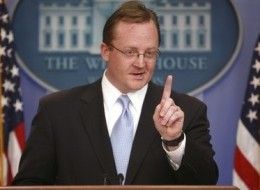Feb 8 09:05 PM US/Eastern
By MATTHEW LEE and BEN FELLER
Associated Pres
By MATTHEW LEE and BEN FELLER
Associated Pres
Robert Gibbs - Press Conference
WASHINGTON (AP) - Struggling to clear up conflicting messages that frustrated even President Barack Obama, the White House worked aggressively on Tuesday to dispel any notion it was easing pressure on President Hosni Mubarak or abandoning those protesting for freedoms.
 Much of the White House ire centered on comments made by Frank Wisner, (photo to right) the retired U.S. diplomat who was dispatched by Obama to help nudgeMubarak out of office, but then stunned Obama officials by saying Saturday that Mubarak's continued leadership was critical as Egypt worked through reforms. Obama himself showed his frustration about what Wisner said, officials said privately.
Much of the White House ire centered on comments made by Frank Wisner, (photo to right) the retired U.S. diplomat who was dispatched by Obama to help nudgeMubarak out of office, but then stunned Obama officials by saying Saturday that Mubarak's continued leadership was critical as Egypt worked through reforms. Obama himself showed his frustration about what Wisner said, officials said privately.Yet part of the confusion has stemmed from the government's own message, too. Comments by some State Department officials have been widely interpreted as diverging from the White House stand, particularly by raising doubts about whether it was wise for Mubarak to resign now, as protesters in his repressed nation demand.
What's more, White House officials were frustrated about some of the news reporting on events. The overall concern was that the narrative was getting cloudy and certainly not focused on the events in Egypt.
So on Tuesday, when Obama spokesman Robert Gibbs was asked about State Department comments on the risks if Mubarak leaves hastily, he bristled.
Responding to the political upheaval in his country, Mubarak has declared that he will not seek re-election in September, but the pace and course of events until then continue to drive debate and force the U.S. to respond.
Gibbs, Obama's spokesman, said the president had not eased his stand thatMubarak should move now toward a transition to a new government.
"The Egyptian government can't reshuffle the deck and then stand pat. President Mubarak's words pledging reform must be followed by action," Crowley said.
Some officials now refer to that as "the Tweet heard round the world."
By the time that message appeared on Twitter on that Saturday, Mubarak had already taken his next step by naming a number two, something long-demanded by the United States, and Crowley's comment was interpreted as the first U.S. reaction to Suleiman's appointment.
The White House was furious, officials said, and Crowley was ordered not to post potentially controversial messages without clearing them first.
Appearing a day later on all five Sunday morning talk shows, Secretary of StateHillary Rodham Clinton seemed taken aback when David Gregory, the host ofNBC's "Meet the Press," read Crowley's Tweet to her. She replied that it was not up to the U.S. to decide who took what position in the Egyptian government. She then made a quick day trip to Haiti.
As Clinton flew home, Wisner was on his way to Cairo aboard a government jet. He met Mubarak on Monday and, a day later, the Egyptian leader went on television to say he would not seek another term in office and would initiate reforms.
But Mubarak's announcement did not go far enough for Washington: He did not announce a repeal of emergency laws and insisted he would remain in office until his current term expires with September elections. Obama took to the airwaves to respond that change must happen "now."
The pressure from U.S. officials for immediate change, though not specifically Mubarak's resignation, continued through the week as the protests in Tahrir Square grew and reached their most cohesive level on Thursday when government supporters attacked protesters and journalists covering the demonstrations.
 The unified message, however, began to unravel again Saturday when Clinton told an international security conference in Munich, Germany, that the Suleiman-led transition process had U.S. support and deserved backing from other countries.
The unified message, however, began to unravel again Saturday when Clinton told an international security conference in Munich, Germany, that the Suleiman-led transition process had U.S. support and deserved backing from other countries.She also said the transition process would "take time" and warned that free and fair elections could not likely be organized in the two-month window that would be required under Egypt's constitution if Mubarak resigned before his term was over.
Wisner then threw himself into the mix—enraging both the State Departmentand the White House—by telling the Munich conference in a video link-up from New York on Saturday that Mubarak was "utterly critical" to the transition process and shouldn't be forced to leave.
The administration distanced itself from Wisner and repeatedly pointed out that he is a private citizen who stopped representing the administration when he left Cairo.
In a half-hour, on-the-record question-and-answer session, she suggested that the administration was now more focused on encouraging "orderly transition" in Egypt than in seeing Mubarak go quickly. And, she implied that Mubarak'scontinued, although less powerful, presence at the top of the Egyptian government might actually help complete the process.
By Monday, the White House had begun to have enough.
 At Monday's press briefing, Gibbs repeatedly reminded reporters that Wisner had been the choice of the Clinton State Department. At least four times he referred questions about Wisner to the Department.
At Monday's press briefing, Gibbs repeatedly reminded reporters that Wisner had been the choice of the Clinton State Department. At least four times he referred questions about Wisner to the Department."I would direct you to my friends at the State Department who brought this recommendation to us," he said at one point.
Copyright 2011 The Associated Press. All rights reserved. This material may not be published, broadcast, rewritten or redistributed.
